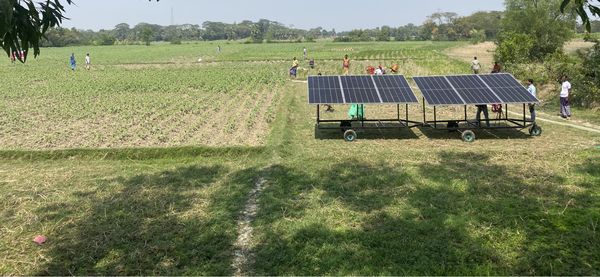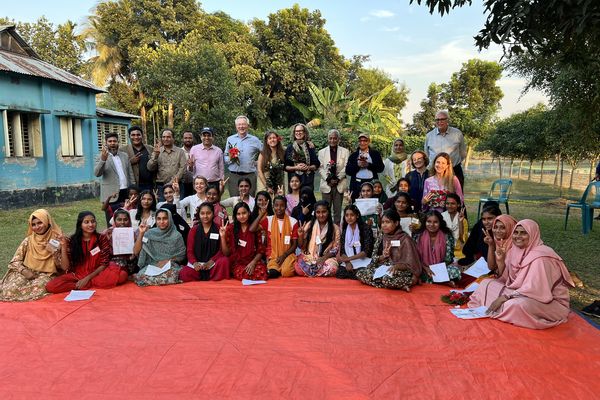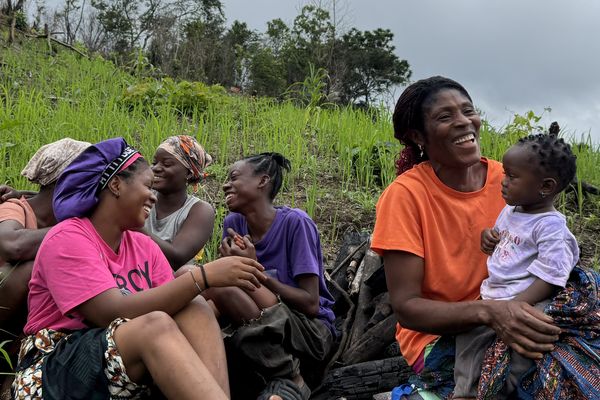The Good Feed: Welcome to the world’s biggest family, Christina! Let’s start with hearing a bit about your background, and what that will mean for BRAC.
Christina Chan: My interest in the intersection of environmental conservation, socioeconomic development and community empowerment started in college. A transformative educational trip to Nepal during my junior year at Stanford University opened my eyes to the importance of pairing environmental conservation with support for livelihood alternatives and economic opportunities. This experience led me to pursue a Fulbright Fellowship in Nepal, where through an independent research project, I dug deeper into the links between environmental conservation and economic development, particularly in the context of historical intra-ethnic dynamics. In graduate school, I got a degree in urban and regional planning, and developed a greater understanding of the role of planning, including the importance of land use planning but also how planning can be driven by social norms as well as be used as a tool to change or create social norms, such as with respect to gender.
I come to the climate space from a development and humanitarian background, which I think is relatively uncommon in the climate change field. Most organisations and individuals engaged in climate change come from environmental backgrounds. My background naturally led me to work on adaptation and loss and damage issues. I have experience in development work with communities, combined with policy advocacy, backed by evidence from fieldwork. I have also switched between the non-government and government sectors – as a policymaker and as a donor, gaining multiple perspectives. I am also passionate about justice and equity, which aligns well with BRAC’s mission.
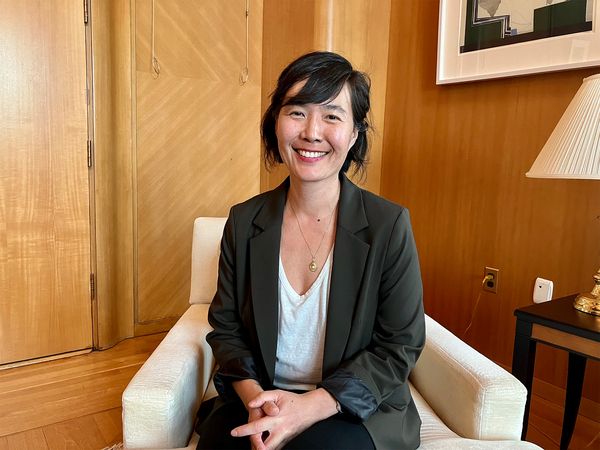
Christina Chan was a key negotiator in the US Government’s climate team. © BRAC 2024
The Good Feed: How did you hear about BRAC, why did you apply for this role, and what excites you about it?
Christina Chan: Having worked at CARE early in my career, BRAC was always part of the conversation. I came to know about BRAC through various colleagues, including Dr Muhammad Musa who was a former Executive Director at BRAC, and Professor Saleemul Huq, a mentor and prominent figure in climate change discussions. BRAC kept coming up time and again in conversations over the last 20 years.
I have been balancing work in the environment, climate, and development space for quite a long time, but working with a community-driven organisation striving to end extreme poverty with an environmental focus was an opportunity I wanted to take. This role at BRAC feels like returning to my development and humanitarian work roots.
The Good Feed: What will your first 100 days at BRAC look like?
Christina Chan: My priority will be to understand BRAC’s core values, operations, the people within the organisation, as well as those it works with. I want to get a comprehensive view of BRAC’s programming efforts. I look forward to working with the team and leadership to set a vision, strategy, and objectives for the Climate Hub. I want to clearly understand BRAC’s current climate change programming and policy efforts, and identify opportunities for future initiatives. By the end of the first 100 days, I hope to articulate these strategic objectives and priorities and work collaboratively with the organisation to identify growth areas, so that we can deepen and scale our impact on people’s lives.
The Good Feed: Do you have a vision yet for where BRAC needs to be in the climate space?
Christina Chan: Given Bangladesh’s experience with disasters and BRAC’s deep experience in inclusive development, there is so much opportunity and potential for an organisation like BRAC to be a real force in climate change programming and policy, and a knowledge base for the world.
BRAC can become a global leader in innovative climate adaptation strategies, leveraging its deep-rooted expertise in development, disaster management, and empowerment to address the challenges posed by climate change. I would like to find ways to translate our learnings – what we know about what works and what doesn’t and why – into policymaking. I would love for BRAC to occupy that space, which is quite bare right now.
The Good Feed: You previously said, “adaptation is about doing development differently in response to climate change.” What does ‘different’ look like for you?
Christina Chan: Doing development differently in a changing climate means integrating climate considerations into development practices.
We need to scale up what we know works in the development space – there is the argument that if we reduce poverty, we reduce vulnerability – but that in itself will not be enough. We need to focus on how we do development in a changing climate.
For instance, take the example of the Millennium Challenge Corporation’s project with the Government of the Philippines, where infrastructure like roads and bridges were designed to withstand climate impacts such as increased flooding. This foresight allowed the infrastructure to survive severe weather events like Typhoon Haiyan, which was critical because they became the only way to deliver humanitarian aid. It’s about building development projects that address current needs but are also robust enough to handle future climate challenges.
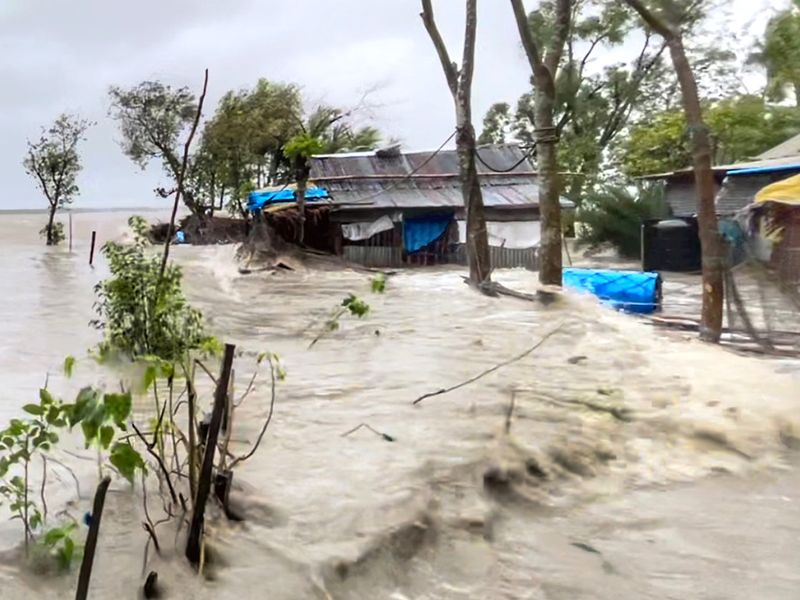
Climate extremes like Cyclone Remal, which struck Bangladesh in May 2024 destroying 35,000 houses, are increasing in both frequency and intensity across the global south. © BRAC 2024
The Good Feed: Funding for climate adaptation is still woefully insufficient. How can we change that?
Christina Chan: We need to effectively communicate the importance and urgency of adaptation. It’s crucial to demonstrate through evidence how our adaptation projects are yielding long-term benefits and resilience across many sectors. We also need to attract more funding from different sources, rather than only climate-specific funds. We really need to mainstream climate change adaptation when it comes to funding.
In the US, climate foundations have been skewed towards funding mitigation, and there has been less focus on adaptation – but that is changing, and we can help foundations, as they are developing their new adaptation strategies and portfolios, to understand the gaps and priorities as well as effective solutions. The private sector is also increasingly understanding the importance of adaptation – both from a corporate social responsibility perspective as well as from the perspective of how climate change is impacting their supply chains.
Read more: Tackling the climate crisis – with a flower: A farmer’s diary
The Good Feed: Funding adaptation in the global south can be seen as a ‘risky’ investment. How can we get funders to reassess risk?
Christina Chan: The key is to present adaptation as a necessary response to climate impacts and a strategic investment for long-term sustainability and resilience. This involves building a solid evidence base to show the effectiveness and benefits of adaptation measures. Communicating success stories, like the infrastructure project in the Philippines that withstood Typhoon Haiyan, can help shift the perception from risk to opportunity.
During my time as advisor to (US Climate Envoy) Secretary Kerry, one of the priorities my team and I identified was communication. It’s vital to build an ecosystem of support for adaptation and resilience and you can’t do that without effective communication and storytelling.
The Good Feed: Climate funding is grossly inadequate, and even the small amounts that do come often don’t make it to the ground. What do we have to do to help funders change that?
Christina Chan: Improving the flow of funds to the ground level requires enhancing the capacity of local organisations to access and effectively use those funds. We must also streamline processes and reduce bureaucratic hurdles that often delay or prevent funds from reaching their intended destinations. Ensuring transparency and accountability in fund allocation and utilisation can build trust among funders and encourage them to commit more resources.
Read more: Women in coastal Bangladesh are losing their uteruses to the climate crisis
The Good Feed: Promoting southern leadership is an integral part of your new role. What key messages would you like to get to the global north?
Christina Chan: It’s vital to communicate the importance of local leadership and context-specific solutions.
Southern communities possess unique insights and expertise vital for effective adaptation. Supporting southern leadership means funding and valuing their knowledge and solutions. Encouraging partnerships that prioritise local voices can lead to more sustainable and impactful outcomes.
There needs to be a diversity of voices in global policy spaces, including at the UN climate conferences.
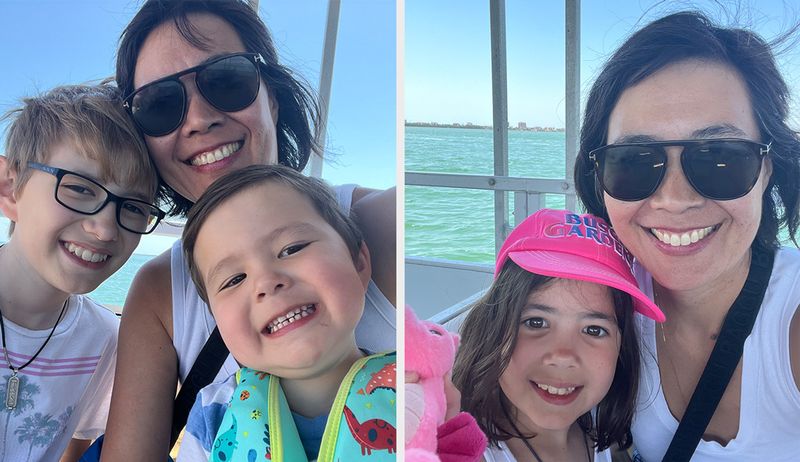
Christina Chan with her three children Ceiran (12), Juniper (7), and Dax (3). © BRAC 2024
The Good Feed: Now, the most important question. What do you enjoy doing in your time off?
Christina Chan: I took four weeks off between my last job and this new job at BRAC. I spent more time with my three children, Ceiran (12), Juniper (7), and Dax (3). I also rediscovered the joy of day reading – and day napping! Any working parent will understand how delightful day reading and napping are… I also enjoy hiking and camping.
